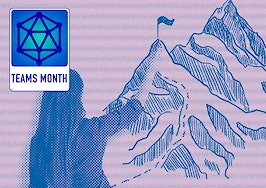 This July, Inman’s editorial theme is Teams — what it takes to build and join one, how to optimize your team for summer 2020, and even when to consider leaving one. And if you’re not already a subscriber to our Teams Beat email newsletter, sent every Thursday, sign up now.
This July, Inman’s editorial theme is Teams — what it takes to build and join one, how to optimize your team for summer 2020, and even when to consider leaving one. And if you’re not already a subscriber to our Teams Beat email newsletter, sent every Thursday, sign up now.
Extraordinary leadership is an art. It is one part genetic disposition, one part skill development and one part passion for the people they serve.
Great team leaders come in a variety of styles and personalities. They’re born out of every background, nationality, sex, orientation and creed. Truth be told, there are very few things they have in common. However, there are four essential things that all great team leaders do.
1. They select the right person for the right role
Traditional wisdom tells us to hire based on experience, intelligence and determination alone. Although all those are important, great leaders look past those details and look for true untapped talent.
Interviewing for this is an art. Few people even know what their true talents are. To start, develop clear, defined roles for each person and role on the team. These will help with screening out the qualified candidates and identify the truly exceptional ones.
In the minds of great leaders, every well-performed role on the team deserves respect. Each person has different roles, but they are all essential and have the same inherent value.
If the team could function the same without a certain role or the person in it, then they shouldn’t be on the team. Remember, excellence is impossible to achieve without natural talent.
2. They set the bar on expectations of each person
Every person on the team needs to know their expected outcomes. Great leaders define the outcomes they want team members to achieve. Average leaders identify how to do a process. Below-average micromanagers will try to do both and rarely achieve either.
Each person should know what they’re trying to achieve as a team, as well as how they all contribute to that goal as individuals. Everyone should know why and how they get paid. Why they get paid must be in alignment with what’s best for your customer, your team and the individual.
Great leaders define the outcomes they want team members to achieve. Average leaders identify how to do a process. Below-average micromanagers will try to do both and rarely achieve either.
3. They motivate each person on the team
Think inspiration, not control. The best leaders focus on their team members’ individual strengths. They let them be more of who they already are.
Great leaders have learned the art of managing around weaknesses. They choose to build on strengths. They help each person discover their inherent strengths. At the end of the day, remember this — everyone has the ability to be exceptional at something.
4. They develop team members to their highest potential
Each person has a unique set of skills, background and interests. Great team leaders take the time to discover the potential of each team member. Then, they invest the time and resources to coach and develop them.
Each person needs to find their highest and best fit within the team. Exceptional team leaders create heroes who achieve things. Each person is recognized and celebrated for their unique contribution.
There isn’t competition between members in this space. The leader helps put each person on their own, handcrafted pedestal. This takes a dedicated amount of consistent feedback, coaching and mentoring.
Leading a team isn’t easy. It’s not like being a solo operator — it takes a separate skill set. Great team leaders know they have to dig for talent to select the right person for the right role.
They’re good at setting expectations for each person based on the outcomes that are best for the customer, the team and the team member. Brilliant leaders motivate through highlighting and celebrating each person’s strengths. Most importantly, they have a passion to inspire each person on the team to be the very best versions of themselves.
Chris Pollinger, partner, Berman & Pollinger, LLC is a senior sales and operational executive skilled in strategic leadership, culture building, business planning, sales, marketing, acquisitions, operations, recruiting, and team building.





